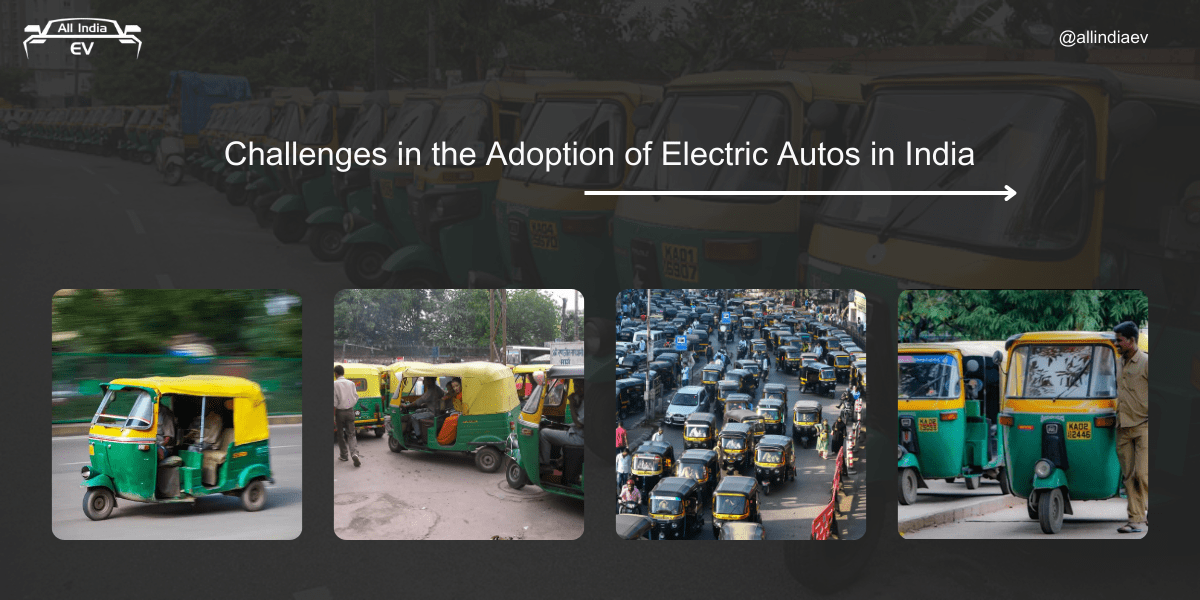
In the fiscal year 2022-23, India saw the registration of a whopping 3.06 lakh auto-rickshaws. Interestingly, a significant 71% of them ran on CNG and LPG, while 14% relied on diesel, and 10% on petrol. Surprisingly, electric autos, despite their potential socio-economic and environmental advantages, comprised only 5% of the total share.
Let’s explore
The road to widespread adoption of electric auto-rickshaws faces various roadblocks, each contributing to the challenges these eco-friendly vehicles encounter. Among these hurdles are the lack of awareness, high initial costs, inadequate charging infrastructure, regulatory inconsistencies, and limited access to affordable financing.
Challenges in the Adoption of Electric Autos in India
🚩 Lack of Knowledge: One major impediment is the insufficient understanding of electric vehicle (EV) technology among drivers. Many remain unaware of the substantial benefits, including lower operational costs and zero emissions. Initiatives like local awareness campaigns and roadshows are pivotal in enlightening transport stakeholders and the public about EVs and the perks they bring.
🚩 Low Availability of Charging Infrastructure: Auto-rickshaws traverse both city streets and inter-city routes, creating a need for accessible charging infrastructure. The scarcity of plug-in points and battery swapping stations induces range anxiety among drivers. Cities should strategize the development of public charging networks, incorporating both slow and fast charging options to cater to the diverse needs of low-voltage EVs.
🚩 High Upfront Cost: While the purchase cost of an electric auto is higher than that of traditional ones, even with subsidies, it’s crucial to convey the long-term economic advantages. Despite the current disparity, educating the public about the lower operational costs of e-autos over the years is imperative for a mindset shift.

🚩 Unsupportive Policy Environment: The policy and regulatory environment also plays a role, with states lagging in implementing exemptions and incentives for e-autos. Clear roadmaps for electrification are absent, contributing to uncertainty in the sector.
🚩 Increased Downtime due to Slow Charging: The slow charging process, taking approximately 4 hours for a full charge, results in increased downtime for e-auto drivers. Mainstreaming battery swapping and fast charging solutions is vital to alleviate this concern and enhance the earning potential of e-auto drivers.
🚩 Limited Model Availability: Financing remains a challenge, with formal banks often hesitant due to perceived risks. Limited availability of loans for e-3Ws, coupled with high interest rates, adds to the financial barriers.
🚩 Other Entry Barriers: Gender discrimination and exclusion from established auto-rickshaw networks create additional hurdles, especially for women and marginalized groups. Collaborative efforts with NGOs and driving institutes can help bridge this gap.
The journey toward widespread adoption of electric auto-rickshaws in India is undeniably challenging, but not insurmountable. A concerted effort involving awareness campaigns, infrastructure development, policy refinement, and financial support can pave the way for a future where e-autos play a more significant role in the country’s transportation landscape. As we overcome these barriers, we move closer to a sustainable and inclusive future, where the benefits of electric three-wheeler passenger vehicles are realized by all.
About the author
Charles is the founder of EVJoints, a startup recognized by Startup India. EVJoints’ goal is to make EV charging more convenient by offering a unified platform that connects charging networks. Their aim is to simplify the user experience, allowing EV owners to charge their vehicles without the need for multiple apps and enabling charging station operators to reach a broader audience, thereby increasing station usage and revenue.
About EVJoints
EVJoints aggregates charging stations, creating an interconnected charging ecosystem. We eliminate the need for installing multiple charging apps from various station owners, streamlining the process of charging electric vehicles (EVs) and managing wallet balances across platforms. Our unified app seamlessly connects EV users to stations across different networks by onboarding charging stations from various networks, alleviating range anxiety and enhancing the overall charging experience. This not only encourages EV users to embark on worry-free, longer trips but also benefits charging station owners by increasing station utilization and simplifying management.
By prioritizing accessibility and convenience, EVJoints actively contributes to the growth and adoption of electric vehicles, playing a pivotal role in shaping a sustainable transportation future.
Social Media Links: Charles Nadar
EVJoints:
